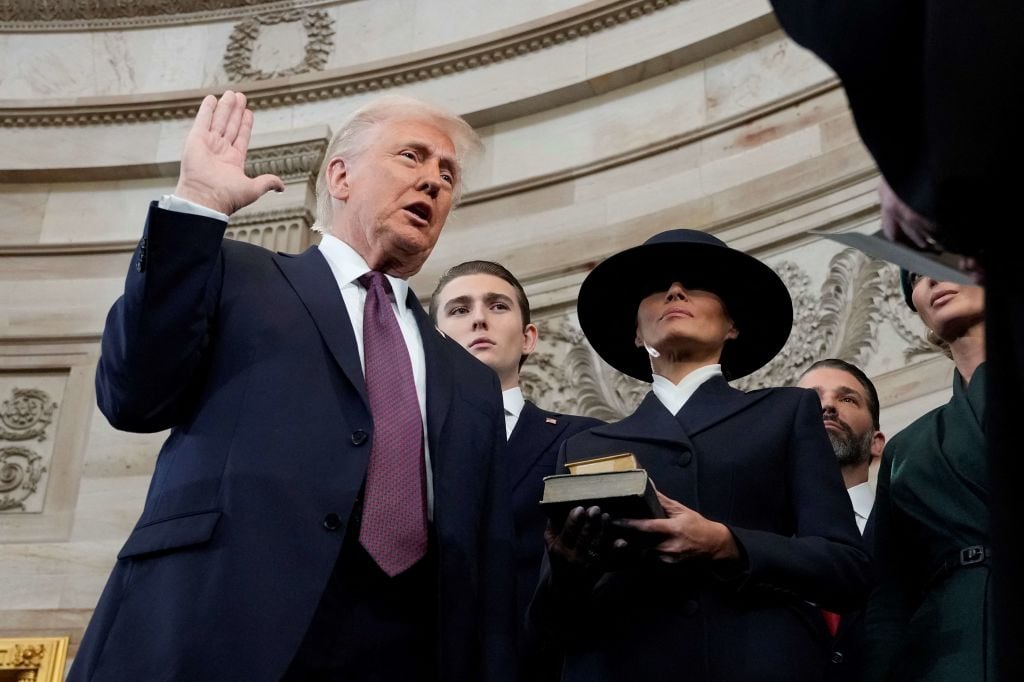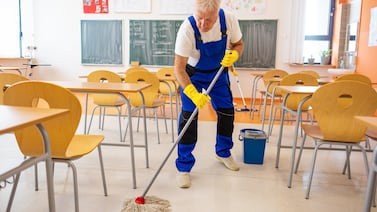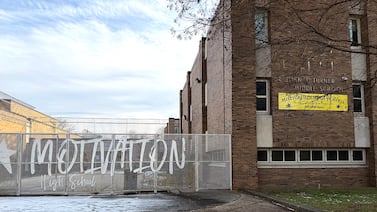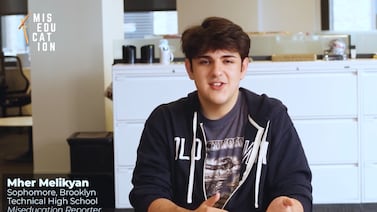Sign up for Chalkbeat’s free weekly newsletter to keep up with how education is changing across the U.S.
Donald Trump will become the 47th president with his inauguration on Monday. What do America’s educators want from him?
It remains to be seen how his administration will directly affect students and teachers. On the campaign trail, Trump pledged to get rid of the U.S. Department of Education, remove “woke ideology” from public schools, and return to the basics of reading, writing, and math. He’s also called for mass deportations and rolling back rights for transgender students.
After the election, Chalkbeat asked teachers around the nation: What do you want Donald Trump to know about your school, your job, and about your students?
More than 150 educators wrote in. Many said they feared what would happen to their immigrant and transgender students. Others said they disagreed with Biden administration policies that required schools to allow transgender students to access restrooms that aligned with their gender. Some said diversity initiatives at their schools were distractions from their core work.
On Trump’s stated intent to close the federal education department, some said they feared the loss of funding and support. Others said they would welcome an end to red tape.
Many said campaign rhetoric about failing schools and politically motivated teachers was deeply hurtful and simply wrong.
“In my school, in my district, we’re not out trying to reculture kids. We don’t have a cultural message; we’re trying to take care of every one of our students,” said Jim Bever, a junior high principal. “When we become ground zero for culture wars, it takes away from the educational work we’re already struggling with.”
But their overwhelming sentiment was a desire that the next administration recognize that teachers care deeply about their students, want to prepare them for success, and are doing a tough job in increasingly challenging circumstances.
And they asked government officials to listen to teachers.
“We tell the government officials that this is what’s happening, and this is what students need, and they don’t listen to us, and these are people that have never stepped foot in a classroom,” elementary school teacher Billie Arthur said. “I wish they would play a more active role to where they can see what it is actually like to be in the classroom.”
Below, we highlight four educators’ requests for Trump as his administration takes shape.
The educators’ answers have been lightly edited for length and clarity.
Make it easier to become a teacher
Laura Patranella, fourth grade English and social studies teacher at Vogel Elementary in Seguin, Texas
We need more creative ways to get more knowledgeable bodies on campus. Our schools need more nerds in them.
— Laura Patranella, fourth grade teacher
I want President Trump to know: The basic economics of becoming a teacher really don’t make sense. If you have to pay for your college to become a teacher, you will always take on college debt. And if 20-somethings look up the starting salaries for teachers in my state and compare that to their potential debt, why would you become a teacher? We’re also hearing in the news and on social media, especially over the last few years, about bad behavior in schools, security concerns, and teachers who are overwhelmed. It’s not an attractive look at the profession. And those in classrooms are asked to do too much.
I would ask the new administration to think about creating more flexibility around who can teach. In my 11 years, I have seen many teachers come into the classroom with a lack of content knowledge. If we can get more content experts, schools can provide training on classroom management. I don’t think we should reduce standards, but the certification process can be more flexible for someone with, for example, a bachelor’s degree in history or math. We need more creative ways to get more knowledgeable bodies on campus. Our schools need more nerds in them.
I really see the need for this in my town. We’re a Title I district in a very blue collar community, where manufacturing jobs at the Caterpillar plant are the good jobs. Teaching jobs should be coveted, but I see my school losing educators every year while struggling to recruit new ones.
It’s getting tougher to keep students engaged
Renée O’Brien, high school English teacher in Pinellas County Schools, Florida
I want President Trump to know: My students come from a wide variety of backgrounds. They practice many different religions, live in every possible type of economic situation, and many have survived the loss of a relative to gun violence. Other students have suffered violence at the hands of police. Many of them are distrustful of the government and feel invisible. They don’t think their voice matters because things don’t change for them. They need better options for their futures. They need strong, well-funded public education that is consistent across the country. We need the Department of Education if we are going to compete globally.
When I hear Trump and [J.D.] Vance talk about teachers as grooming students and trying to teach them quote-unquote woke ideology, I hear, “You don’t want kids to think critically. You want them to think the way you want them to.” And I have always strived as a teacher to challenge kids to think for themselves.
There are challenges in the curriculum. The state of Florida has adopted this CLT test, which is a test of classic literature, and there’s a lot of mythology on it. My ninth graders are not going to be inspired to read more by reading a lot of Greek mythology. I feel like we could do a lot better to give them things that speak to them, and the state of Florida says no. It makes it much harder for the kids to be interested. They just want to get the right answer, because they don’t have a personal interest in the stories. They fight against critical thinking, and when you tell them, “You have to come up with the answer,” a lot of times, kids will go, “I don’t care. Then give me a zero.”I had not seen that until recently. I think a lot of it has to do with during COVID, we were really pushed to just pass the kids and not hold them to a very high standard. And it’s just kind of snowballed into a fear of being challenged.
Schools need more autonomy, broader measures of student success
Jim Bever, principal at Greenfield Central Junior High School in Greenfield, Indiana
I want President Trump to know: Our kids from working-class backgrounds struggle in the academic worlds created by academic standards and accountability testing. Schools are built on a mass production concept. You start kindergarten at the same age and move through in sync. In Midwest areas like ours, there are a number of our families where college may not be in the picture.
Educational success doesn’t look the same for every child who walks through our door. Standardized testing doesn’t adequately assess the depth of a student’s understanding and potential.
When we have students who need more time to cognitively mature to take in all the material we are moving past them at a high rate, we start alienating those students. I hear parents say that they want their kids to like school, but it’s hard to like school when you are made to feel from constant testing that you are bad at it.
School is not a one-size-fits-all proposition, and there should be greater flexibility with national accountability standards. This is nothing against academic rigor, but clearly, something isn’t working. Schools are working as hard as we can, yet our scores nationally and internationally are lagging.
If we need different outcomes, we need support, equipment and space to do things very differently than in the past. Give us flexibility at the local level to determine school success based on student needs.
For students who’ve experienced trauma, school resources matter
Billie Arthur, first grade teacher at Clarksville Elementary School in Clarksville, Indiana
I want President Trump to know: I teach in a small town with a close knit school system. We have one elementary, one middle, and one high school. Our elementary school is the heart of our community. The teachers pay for school supplies, snacks, clothes, and Christmas gifts out of their own pockets. In many cases, the school is the only safe place for our students. With the stability of our school, many of our students have gone on to have successful careers and have broken the chain of their childhood.
We are a Title I school, so we receive a lot of Title I funding, which gives our students the opportunity to have some experiences that they wouldn’t get otherwise. I’m very passionate about Title I funding. We are able to provide free breakfast and free lunch for every student, regardless of income. We have a high population of special education students, and the federal government helps us with their needs so that they are able to get a fair education. And then we also are able to purchase a lot of materials that the school wouldn’t be able to purchase on their own.
In many cases, the school is the only safe place for our students.
— Billie Arthur, first grade teacher
I’d like for [government officials] to know these young children that I teach are human beings, and I’d like for them to know they’re not a statistic, they’re not a number. They are a child who has feelings, has emotions, has gone through trauma. I would like them to see that we’re not cookie cutter, that large, affluent school systems are not the same as a small town, rural school system, and that the needs are different.
I have students who come to me and they don’t know their alphabet, they don’t know how to write their name, they don’t know how to cut, and they’re first graders. Kiddos here at this school, some of them have been through more than I will ever experience in my life, and they’re six and seven.
We love these babies. I would do anything for my students. We elementary teachers go over to the middle school or the high school, and it’s so nice to see your former students perform at a basketball game or on stage in the play. We’re so proud of them. It just means the world to us to see them be successful.
Caroline Bauman is Chalkbeat’s deputy managing editor for engagement. Reach her at cbauman@chalkbeat.org.
Erica Meltzer is Chalkbeat’s national editor based in Colorado. Contact Erica at emeltzer@chalkbeat.org.







